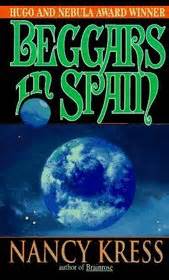In this Hugo and Nebula Award Winner, Nancy Kress creates a near future where scientists have discovered that sleep is a left-over mechanism that’s no longer necessary, like the appendix. Gene modifications can make you a “sleepless,” which also has the side effects of making you smarter, and stopping biological aging at adulthood. Sounds good, right? Then you could be super productive with all that extra time. Way more than your “sleeper” colleagues. (Think of how many more books you could read!)
The modification has to start in vitro, so your parents decide your fate. In this tale, Kress spins out all the ramifications of this choice, from complications in interpersonal relationships to political, economic and cultural change. It’s truly a tour de force, and it didn’t have to be a trilogy! I get a little sick of authors (probably pushed by greedy publishers) dragging out one book into three nowadays. This was actually a novella to start with, but it doesn’t feel padded at all to me. I always wanted to find out what was happening next, and a lot happens in less than a hundred years, the span of one lifetime—for a Sleeper.
The story follows Leisha and Alice Camden, unlikely twins in that Leisha was the designed baby, a Sleepless, and Alice was the accident that tagged along, just an ordinary Sleeper. Well, Dad is the one who is obsessed with changing the world through his child with this new technology, but Mom just wanted a regular ol’ baby, so they each ally with a different child. This affects the way Leisha and Alice relate to each other, of course, and even though she’s given every advantage, Leisha feels like an outsider. When Leisha finally meets another Sleepless in her pre-teens, she realizes just how isolated she’s felt. She needs community.
Kress examines ideas about individual responsibility and community, which I was afraid would just boil down to the Star Trekkian “needs of the many outweigh the needs of the few” or vice versa, depending on who is in peril. But Kress complicates the equation by adding economic change that results from the prejudice that develops between the two groups, Sleepers and Sleepless. Even though the Sleepless stay a minority (the poor can’t afford the procedure, and the rich aren’t interested, just the middle class with a work ethic who want to achieve more), they gradually start doing all the valuable work of society. They are much more effective than Sleepers at finding new scientific and technological breakthroughs, so why should Sleepers bother? Sleepers benefit, becoming a huge and unlikely leisure class, part of a superrich welfare state, which kind of blew my mind. Sleepers think they control the economy but the Sleepless minority eventually pushes back.
I’ve never thought much about how economics shapes culture, but this story made it fascinating. And it’s just fun to read, to imagine all these possible gene modifications. A couple generations after Leisha, a cloistered Sleepless community creates Superbrights, who also do not sleep, but are orders of magnitude more intelligent than the first generations of Sleepless. Kress’ way of explaining how they think, in strings, is just gorgeous. I also appreciated lucid dreaming being presented as an art form that help the Superbright solve difficult scientific problems.
This novel is just packed with goodies. Highly recommended.

